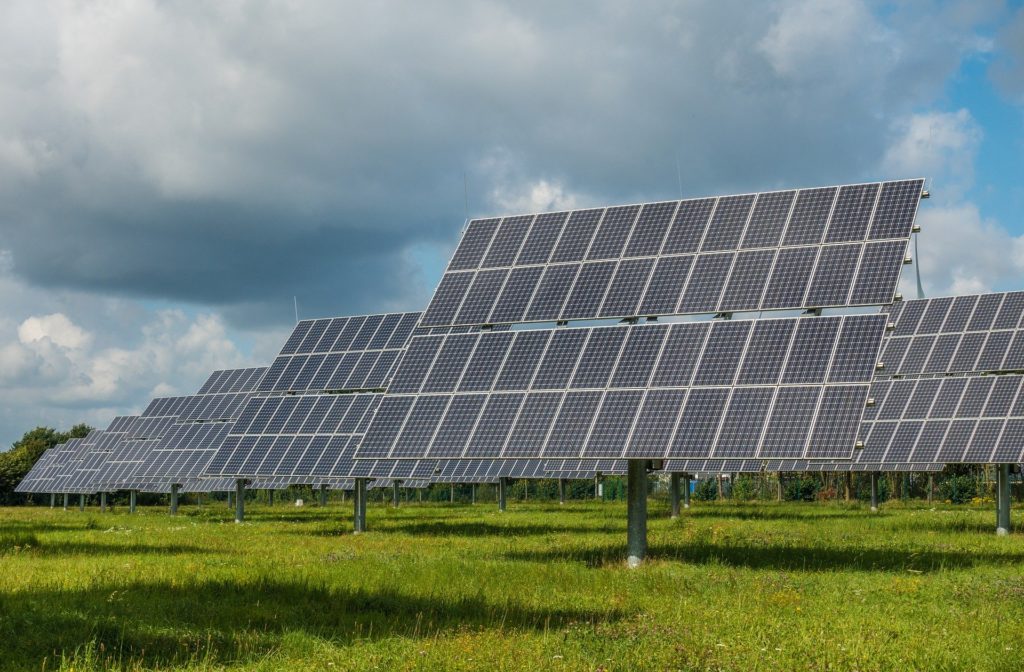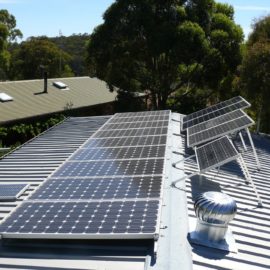
Solar developers and farmers have met and rules were talked about as well as a frank exchange of ideas.
Dozens of farmers, lobbyists and representatives for the solar industry started hashing out their differences Tuesday over rules for solar projects that have started popping up across the state, which have sparked pushback from farmers worried they can’t compete with the companies for land. Officials with the state Department of Natural Resources held two hearings Tuesday to begin gathering input from the various players. The meetings kicked off a months-long rulemaking process for utility-scale solar projects. Farmers complained the projects are taking land away from agriculture interests, and that would-be builders of such projects are outbidding them for land. Representatives of landowners asked regulators not to limit their ability to lease their land to who they want. And people representing the solar industry warned the state could lose out on big investments in renewable energy if the state singles out solar energy for heavy-handed regulation. The backdrop for the hearings was a legislative session that featured several lawmakers sympathetic to agriculture interests pushing proposals that took aim at solar projects. Such projects are gaining momentum in Louisiana, even though they represent a tiny fraction of the electricity generated in the natural gas-dominated state.
Theadvocate.com
Sen. Bret Allain had a successful proposal which required drafting regulations for solar. As noted above, most were pro-farmers.
“Property owners absolutely have the right to lease their property for whatever they want to,” said Allain, a landowner and sugarcane farmer from Franklin. “But I think it’s on us to make sure it’s done correctly and with the least amount of impact and protecting the environment and communities they’re in.” Sen. Beth Mizell, R-Franklinton, also passed a resolution calling for a public hearing on the topic. Mizell, who represents Washington Parish, where local officials have put a moratorium on new solar projects, has been one of the most outspoken critics of the solar projects that have popped up in the state. “Before we move forward with giving an industry unbridled opportunity in our state, there (needs to be) regulations,” Mizell said.
Competition for land was the greatest concern. Solar can spend more than farmers but solar then takes the land away from farming. Some farmers rent the land and if the owner sells they are left out. Solar can effect the mill operations as well as if few are left to support the mill it will close.
Proponents of solar say the fears that solar projects will take big chunks of agricultural land out of farmers’ hands are largely unfounded. While developers are negotiating options contracts for land, most projects will not come to fruition. A representative of the Public Service Commission said at one of the hearings that solar energy, which provides a minuscule fraction of the electricity generated in Louisiana, has a natural ceiling because the state needs backup power when the sun isn’t shining. Stephen Wright, executive director of Gulf States Renewable Energy Industry Association, said plenty of states have established “extensive rules” for solar projects that could easily be adopted in Louisiana. For instance, some states require developers to put up bonds to ensure the projects will be decommissioned at the end of their life. Allain suggested that will be a key part of the rules. “We don’t have to reinvent the wheel,” Wright said, cautioning officials with the DNR not to put “punitive” restrictions on the industry.
Wilson Lagraize, an accountant in Washington Parish, raised health questions as he claims that solar can effect health and environmental questions.
Solar projects, like almost any large capital-intensive project, have for years been eligible for the state’s generous Industrial Tax Exemption Program for manufacturers. But a resolution passed by House Speaker Clay Schexnayder asks the board that doles out those tax breaks to halt them for solar projects until next year. “Is it worth us giving up those revenues and have all the risks of environmental hazards, health hazards…is it worth it?” Lagraize said. “Frankly, I don’t think it is in Washington Parish.” The development that has Franklinton residents up in arms is a solar project on 440 acres of property at the LSU AgCenter’s Southeast Research Station, which LSU leased to a private developer called Iris Solar, LLC in 2016. LSU AgCenter spokesperson Frances Gould said the LSU AgCenter turned to leasing the property out to minimize the effects of steep budget cuts implemented by lawmakers in the 2000s. The project is expected to be completed in August. “The (request for proposals) outlined the AgCenter’s intent to further its mission through research, extension and teaching opportunities while continuing dairy research operations at the Southeast Research Station in Franklinton, Louisiana,” Gould said.
Mark Yates, vice president of the Advanced Power Alliance, noted that solar become the largest tax payer.
That’s because they pay sales taxes and property taxes on the equipment. With the industrial tax exemption, developers pay just 20% of the property taxes they would otherwise owe 10 years. “I understand the apprehension,” Yates said. “It is new. And there is a lot of education that needs to be done at the local level and the state level.”
Solar is needed and to see that they are going one on one with farmers says that they have been accepted and are players. That is a step forward.


![Together New Orleans wins unanimous vote for Community Solar overhaul Together New Orleans [logo]](https://gnoicc.org/wp-content/uploads/2023/11/tno.jpg)